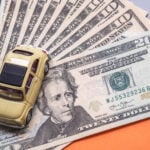Looking to save on your expenses? One of the most common ways to save on your monthly expenses is to slash your car expenses. It is almost the easiest way to cut down your flab. But do you know the right way to slash your car expenses?
Ask anyone what their two major investments in life are, and you‘ll likely hear housing and cars, the most. Based on stats from 2020, an average American spends around $9,000 per year for a new car’s smooth operation and more than $10,000 every year for cars that have covered more than 9000 miles. However, these high rates should not be worrying for you, as these are cumulative car expenses that include the cost of maintenance, car insurance, and your driving habits.
That said, there are plenty of ways available to slash your car expenses and save money. All you need to do is modify your driving habits to more economical ones, consider various options before confirming a random car insurance scheme. You can further save more if you don’t mind getting your hands dirty with some DIY car care at home. I’m pretty sure you‘re willing to do this to save some dollars, so without wasting a moment more, let’s dive into the top 5 ways to save big on car expenses.
Be Gentle on Your Car and Practice Good Driving Habits
We all know how the race between the hare and tortoise finished, and who ended up the winner. In life, too, this is a valuable lesson to keep in mind, especially when it comes to driving. You don‘t need to break speed limits, drive aggressively, and slam the brakes frequently when you drive. All you need to do instead is to leave early, have patience (especially in traffic), and maintain a speed that’s somewhere around 50mph. Road traffic studies and driver behavior studies conducted by numerous agencies have all pointed out that regular aggressive driving antics like constant acceleration and frequent braking all lead to fuel efficiency drops that range from 15% to 40%. Why not change your driving behavior today, and thereby save money by up to 40% that you would otherwise spend on gas?
Opt for Pay-per-Mile Car Insurance
It’s known as a “good problem” for drivers who don’t put a lot of miles on their odometers. Driving fewer miles reduces wear and tear on your car, saves money at the petrol pump, and lowers the risk of a car accident. All of them are positive attributes. However, you continue to pay for auto insurance that does not adequately compensate you for your limited driving.
Pay-per-mile insurance is supposed to give you more control over your monthly auto insurance premium by allowing you to select how much you drive. There’s a link between how many miles people drive and their chances of getting into an accident. You get the same coverage as you would with regular auto insurance and pay-per-mile insurance.
Milewise from Allstate and SmartMiles from Nationwide provide the best pay-per-mile car insurance.
Visit Way.com for more details about the different insurance options and answers to all your car-related queries.
Learn Basic Car Care Techniques and DIY at Home
A happy car will never let its driver down, and you can trust it with both your eyes closed before heading out. However, as the driver, you need to make sure that the car is running smoothly and everything is working fine. There are also plenty of simple fine-tuning methods that can be followed at home, without having to visit a mechanic. All you need is a basic mechanical tool kit and some free time to learn the tricks from tutorials and DIY videos available on the internet. Please note that we are not talking about engines or other complicated mechanical works. Instead, the focus is on basic checks like checking tire pressure and inflating on time, changing engine oil, air filter at regular intervals, and swapping tires to have equal wear.
Even if you are not confident enough to do this on your own, you can still slash car expenses in the long run. If you make these fixes at regular intervals rather than carrying it forward without fixing it for more kilometers. Running dry on engine oil, having a dirty air filter, or even tires with low air pressure all deteriorate your car’s overall performance. In turn, this could also make way for a drop in fuel efficiency and even mechanical issues in the long run. If you know someone who takes good care of their vehicles, ask them how much it costs to maintain their cars. You would be surprised that it costs way less for them than those who drive their vehicles without timely repairs.
Be Smart When It Comes to Filing Claims
Accidents always happen when you least expect them, and yes, that is why we ensure cars are protected with car insurance schemes in the first place. Insurance is the financial crutch that helps us when it comes to fixing the mess post-accident. However, is it worth going for a claim in every other instance? The answer is a definite no! Yes, you could file a claim and get financial aid for all kinds of accidents. However, you also run the risk of getting a massive hike. That could be anywhere from 15% – 41% on your insurance premium. Always consider whether it is worth raising a claim, especially in cases of minor accidents where you are at fault. Pay for the minor damages from your pockets, and save the insurance for something that would put a more significant dent on your budget instead.
Fixable Things You Can Start Today to Save Money
Every day is a new opportunity to learn new things, and what’s better than finding new ways to save money and slash your overall car expenses? Starting with the basics you learned in your driving classes, self-evaluate your driving behavior. Are you someone who:
- Slams the brakes and rapidly accelerates at every other stop-and-go instance
- Idles their car engine without turning it off when waiting for someone
- Keeps changing gears instead of going into cruise mode on open, empty roads
- Rarely enquires about discounts, insurance schemes, fills premium gas
- Cannot drive with the windows rolled down
Bottom Line
Well, change now! City roads are always full of other cars, pedestrians, and even (in some cities) different modes of transport like trams and cable cars. Respect your fellow commuters, and abide by the road rules (especially speed limits and other traffic regulations). Idling the engine for more than a minute is never good, and this specifically causes harm to your fuel efficiency. Turn off the engine if you are waiting for someone. There are always plenty of discounts in the auto world, regardless of whether it is maintenance, insurance schemes, or rewards for good driving behavior.
Be willing to go the extra mile and always ask your dealer if any offers are available. You would also have realized that the best way to slash your car expenses is by saving big on fuel. Does premium gas work wonders? There would be people who believe it does. Even if it does, it would probably be minimal when we consider performance standards.
If you want to save money on car expenses, it is about time you started considering cutting down on premium gas stations and replacing them with lesser-known alternatives. Lastly, it’s always good to feel the fresh air every now and then. Drive with the windows rolled down. It saves fuel and brings you closer to enjoying a more natural drive, as well.
Renée Martin is a travel and car expert who focuses on road and air travel in the U.S. For the past 6 years, she’s been helping make driving and trip planning easier and budget-friendly for everyday travelers.

















